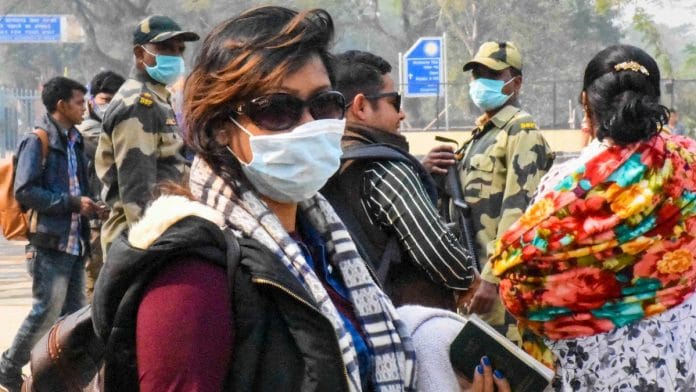New Delhi: A study published last year has become the subject of controversy over the participation of foreign researchers and a media report purportedly linking it to China’s coronavirus outbreak.
Conducted on members of a Nagaland tribe in 2017, the study sought to study viral transmissions between bats and human beings in areas where they come into close contact.
Bats are known “reservoirs for several zoonotic pathogens, including filoviruses”. Filoviruses include the deadly Ebola, and are known to cause haemorrhagic fever in human beings.
The study found Ebola antibodies in some of the human subjects despite the fact that the disease, which has killed thousands in Africa over the years, has never been reported in the area.
It was conducted by researchers from the Bengaluru-based National Centre for Biological Sciences (NCBS, which comes under the Tata Institute of Fundamental Research), China’s Wuhan Institute of Virology, Duke-NUS of Singapore, and Uniformed Services University of the Health Sciences, US.
The study, published in the reputed PLOS journal, was expected to help explore the prevention of diseases like Ebola, which caused thousands of deaths in western Africa between 2013 and 2016.
Also Read: Calling Baker Street! IISc duo’s ‘power breakthrough’ has kicked up a Sherlockian mystery
Investigation ordered
In a report dated 3 February, The Hindu reported that the health ministry had ordered an investigation into the study over allegations that it didn’t seek the requisite clearance for involving foreign researchers.
Questions have reportedly also been raised about the fact that the study’s funding sources included the US Department of Defence’s Defence Threat Reduction Agency (DTRA), which deals in countering weapons of mass destruction.
The report also appeared to link the development to the ongoing coronavirus outbreak, saying the study was being probed as some of the researchers involved belonged to the Wuhan Institute of Virology in China.
The inquiry comes as officials worldwide grapple with the spread of novel #coronavirus 2019, from #Wuhan, China, to 20 countries, that has resulted in over 300 deaths https://t.co/CriOKhTNPT
— The Hindu (@the_hindu) February 3, 2020
The coronavirus outbreak has claimed nearly 500 lives in China.
The virus behind the outbreak is believed to be hosted by bats — identified as sources of at least two previous coronavirus outbreaks — and the resort town of Wuhan has emerged as the epicentre of the crisis.
The Hindu changed the headline of its online story after NCBS researchers questioned its report.
‘No connection to coronaviruses’
According to Indian Council for Medical Research (ICMR) guidelines, biomedical or health research projects involving foreign assistance or collaboration require the approval of the Union Health Ministry’s Screening Committee (HMSC), which was constituted in the early 1980s.
According to sources quoted in The Hindu report, the NCBS researchers did not have these permissions, prompting the ICMR to send a five-member committee to investigate the study.
While the inquiry report is believed to have been submitted to the Union Health Ministry, researchers have lashed out at The Hindu report for trying to link the study to the coronavirus outbreak.
They have also claimed that they went by procedure.
Mukund Thattai, a researcher at the NCBS who was not directly involved in the study, alleged that the report spun a false conspiracy theory.
I was shocked to see such shoddy journalism from @the_hindu. They spun a 3-month-old *open-access* paper into a "secret" conspiracy theory, without even requesting a statement from the authors! The report, even the headline, contained many false statements. pic.twitter.com/oB3Q02nVpY
— Mukund Thattai (@thattai) February 4, 2020
In a tweet from its official handle, the NCBS said The Hindu had misreported the story, unnecessarily linking it to coronaviruses in the middle of an ongoing global health scare.
PRESS STATEMENT: Yesterday @the_hindu published an article titled: “Coronavirus : Wuhan institute's study on bats and bat hunters in Nagaland to be probed”.
The article is erroneous on several counts and we have issued an official statement on the same: https://t.co/MSeGCSmtSG
— National Centre for Biological Sciences (@NCBS_Bangalore) February 4, 2020
The NCBS also posted a link to a more elaborate statement, saying scientists from Wuhan Institute of Virology were not directly involved in the study.
“They were listed co-authors ONLY because they supplied reagents critical to the study to Duke-NUS. This is standard practice for scientific authorship,” the statement read.
It added, “The corresponding author of the study is affiliated to Duke-NUS. Therefore, the funding statement of the paper mentions funding obtained by Duke-NUS from the U.S. Defense Threat Reduction Agency (DTRA). NCBS is not a direct recipient of research funds from DTRA.”
No biological samples or infectious agents, it added, were transferred into or out of India, and “this study has NO connection with coronaviruses”.
ThePrint reached ICMR officials and NCBS researchers for comment by email but there was no response until the time of publishing. This report will be updated when they respond.
However, a senior adviser in the office of the Principal Scientific Adviser to the Government of India, Shailja Vaidya Gupta, who has handled international collaborations at the Department of Biotechnology, tweeted in support of the researchers.
She said misreporting such stories adds to “unnecessary confusion” and “leads to the belief that bilateral projects should necessarily be eyed with suspicion”.
Just to be very clear: any project under a bilateral agreement, agreement which has the approval of competent authority of GoI, doesnot need HMSC clearance. HMSC clearance is needed only for clinical trials in such cases. Will find the clause in the guidelines when I have time.
— Shailja (@himdaughter) February 5, 2020
Also Read: What we know of coronavirus so far, and how Modi govt is monitoring it in India






